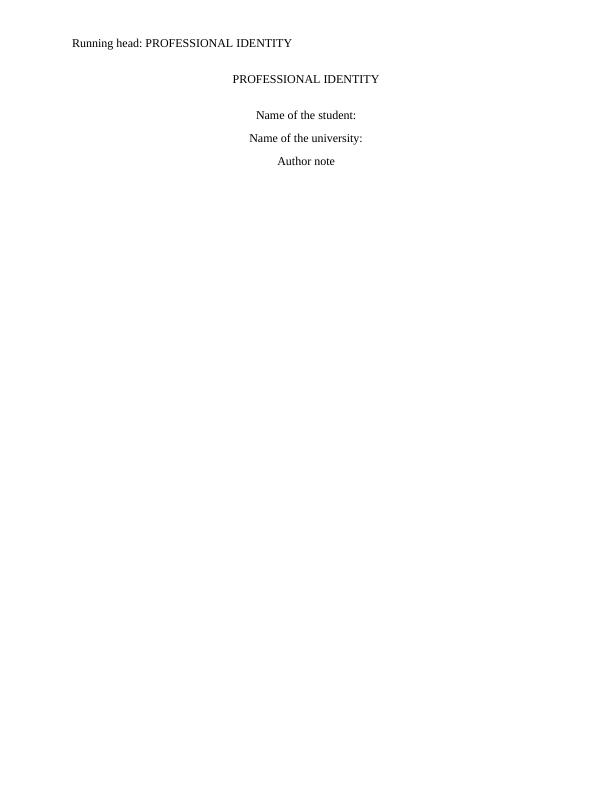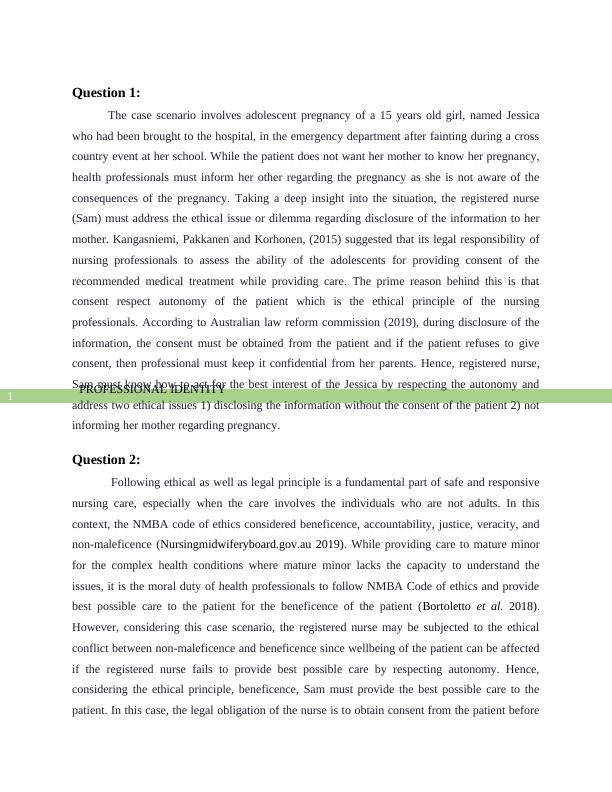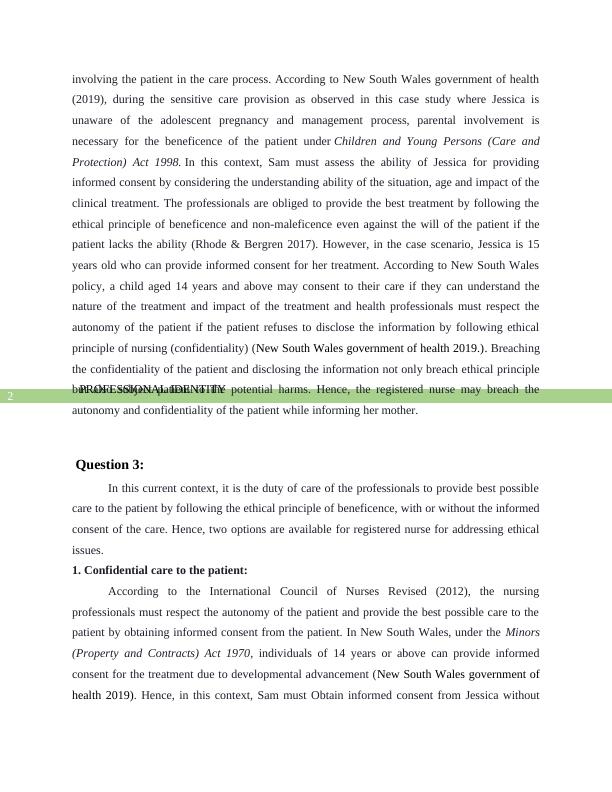Ethical Issues in Adolescent Pregnancy: A Case Study
Added on 2022-11-13
7 Pages2364 Words412 Views
Running head: PROFESSIONAL IDENTITY
PROFESSIONAL IDENTITY
Name of the student:
Name of the university:
Author note
PROFESSIONAL IDENTITY
Name of the student:
Name of the university:
Author note

PROFESSIONAL IDENTITY
1
Question 1:
The case scenario involves adolescent pregnancy of a 15 years old girl, named Jessica
who had been brought to the hospital, in the emergency department after fainting during a cross
country event at her school. While the patient does not want her mother to know her pregnancy,
health professionals must inform her other regarding the pregnancy as she is not aware of the
consequences of the pregnancy. Taking a deep insight into the situation, the registered nurse
(Sam) must address the ethical issue or dilemma regarding disclosure of the information to her
mother. Kangasniemi, Pakkanen and Korhonen, (2015) suggested that its legal responsibility of
nursing professionals to assess the ability of the adolescents for providing consent of the
recommended medical treatment while providing care. The prime reason behind this is that
consent respect autonomy of the patient which is the ethical principle of the nursing
professionals. According to Australian law reform commission (2019), during disclosure of the
information, the consent must be obtained from the patient and if the patient refuses to give
consent, then professional must keep it confidential from her parents. Hence, registered nurse,
Sam must know how to act for the best interest of the Jessica by respecting the autonomy and
address two ethical issues 1) disclosing the information without the consent of the patient 2) not
informing her mother regarding pregnancy.
Question 2:
Following ethical as well as legal principle is a fundamental part of safe and responsive
nursing care, especially when the care involves the individuals who are not adults. In this
context, the NMBA code of ethics considered beneficence, accountability, justice, veracity, and
non-maleficence (Nursingmidwiferyboard.gov.au 2019). While providing care to mature minor
for the complex health conditions where mature minor lacks the capacity to understand the
issues, it is the moral duty of health professionals to follow NMBA Code of ethics and provide
best possible care to the patient for the beneficence of the patient (Bortoletto et al. 2018).
However, considering this case scenario, the registered nurse may be subjected to the ethical
conflict between non-maleficence and beneficence since wellbeing of the patient can be affected
if the registered nurse fails to provide best possible care by respecting autonomy. Hence,
considering the ethical principle, beneficence, Sam must provide the best possible care to the
patient. In this case, the legal obligation of the nurse is to obtain consent from the patient before
1
Question 1:
The case scenario involves adolescent pregnancy of a 15 years old girl, named Jessica
who had been brought to the hospital, in the emergency department after fainting during a cross
country event at her school. While the patient does not want her mother to know her pregnancy,
health professionals must inform her other regarding the pregnancy as she is not aware of the
consequences of the pregnancy. Taking a deep insight into the situation, the registered nurse
(Sam) must address the ethical issue or dilemma regarding disclosure of the information to her
mother. Kangasniemi, Pakkanen and Korhonen, (2015) suggested that its legal responsibility of
nursing professionals to assess the ability of the adolescents for providing consent of the
recommended medical treatment while providing care. The prime reason behind this is that
consent respect autonomy of the patient which is the ethical principle of the nursing
professionals. According to Australian law reform commission (2019), during disclosure of the
information, the consent must be obtained from the patient and if the patient refuses to give
consent, then professional must keep it confidential from her parents. Hence, registered nurse,
Sam must know how to act for the best interest of the Jessica by respecting the autonomy and
address two ethical issues 1) disclosing the information without the consent of the patient 2) not
informing her mother regarding pregnancy.
Question 2:
Following ethical as well as legal principle is a fundamental part of safe and responsive
nursing care, especially when the care involves the individuals who are not adults. In this
context, the NMBA code of ethics considered beneficence, accountability, justice, veracity, and
non-maleficence (Nursingmidwiferyboard.gov.au 2019). While providing care to mature minor
for the complex health conditions where mature minor lacks the capacity to understand the
issues, it is the moral duty of health professionals to follow NMBA Code of ethics and provide
best possible care to the patient for the beneficence of the patient (Bortoletto et al. 2018).
However, considering this case scenario, the registered nurse may be subjected to the ethical
conflict between non-maleficence and beneficence since wellbeing of the patient can be affected
if the registered nurse fails to provide best possible care by respecting autonomy. Hence,
considering the ethical principle, beneficence, Sam must provide the best possible care to the
patient. In this case, the legal obligation of the nurse is to obtain consent from the patient before

PROFESSIONAL IDENTITY
2
involving the patient in the care process. According to New South Wales government of health
(2019), during the sensitive care provision as observed in this case study where Jessica is
unaware of the adolescent pregnancy and management process, parental involvement is
necessary for the beneficence of the patient under Children and Young Persons (Care and
Protection) Act 1998. In this context, Sam must assess the ability of Jessica for providing
informed consent by considering the understanding ability of the situation, age and impact of the
clinical treatment. The professionals are obliged to provide the best treatment by following the
ethical principle of beneficence and non-maleficence even against the will of the patient if the
patient lacks the ability (Rhode & Bergren 2017). However, in the case scenario, Jessica is 15
years old who can provide informed consent for her treatment. According to New South Wales
policy, a child aged 14 years and above may consent to their care if they can understand the
nature of the treatment and impact of the treatment and health professionals must respect the
autonomy of the patient if the patient refuses to disclose the information by following ethical
principle of nursing (confidentiality) (New South Wales government of health 2019.). Breaching
the confidentiality of the patient and disclosing the information not only breach ethical principle
but also subject patient to the potential harms. Hence, the registered nurse may breach the
autonomy and confidentiality of the patient while informing her mother.
Question 3:
In this current context, it is the duty of care of the professionals to provide best possible
care to the patient by following the ethical principle of beneficence, with or without the informed
consent of the care. Hence, two options are available for registered nurse for addressing ethical
issues.
1. Confidential care to the patient:
According to the International Council of Nurses Revised (2012), the nursing
professionals must respect the autonomy of the patient and provide the best possible care to the
patient by obtaining informed consent from the patient. In New South Wales, under the Minors
(Property and Contracts) Act 1970, individuals of 14 years or above can provide informed
consent for the treatment due to developmental advancement (New South Wales government of
health 2019). Hence, in this context, Sam must Obtain informed consent from Jessica without
2
involving the patient in the care process. According to New South Wales government of health
(2019), during the sensitive care provision as observed in this case study where Jessica is
unaware of the adolescent pregnancy and management process, parental involvement is
necessary for the beneficence of the patient under Children and Young Persons (Care and
Protection) Act 1998. In this context, Sam must assess the ability of Jessica for providing
informed consent by considering the understanding ability of the situation, age and impact of the
clinical treatment. The professionals are obliged to provide the best treatment by following the
ethical principle of beneficence and non-maleficence even against the will of the patient if the
patient lacks the ability (Rhode & Bergren 2017). However, in the case scenario, Jessica is 15
years old who can provide informed consent for her treatment. According to New South Wales
policy, a child aged 14 years and above may consent to their care if they can understand the
nature of the treatment and impact of the treatment and health professionals must respect the
autonomy of the patient if the patient refuses to disclose the information by following ethical
principle of nursing (confidentiality) (New South Wales government of health 2019.). Breaching
the confidentiality of the patient and disclosing the information not only breach ethical principle
but also subject patient to the potential harms. Hence, the registered nurse may breach the
autonomy and confidentiality of the patient while informing her mother.
Question 3:
In this current context, it is the duty of care of the professionals to provide best possible
care to the patient by following the ethical principle of beneficence, with or without the informed
consent of the care. Hence, two options are available for registered nurse for addressing ethical
issues.
1. Confidential care to the patient:
According to the International Council of Nurses Revised (2012), the nursing
professionals must respect the autonomy of the patient and provide the best possible care to the
patient by obtaining informed consent from the patient. In New South Wales, under the Minors
(Property and Contracts) Act 1970, individuals of 14 years or above can provide informed
consent for the treatment due to developmental advancement (New South Wales government of
health 2019). Hence, in this context, Sam must Obtain informed consent from Jessica without

End of preview
Want to access all the pages? Upload your documents or become a member.
Related Documents
Nursing Ethics Question 2022lg...
|7
|2608
|10
Ethical and Legal Considerations in Nursing: A Case Studylg...
|7
|2256
|155
Professional Identify: Legal and Ethical Issues in Nursing Practicelg...
|8
|1925
|61
Professional Identitylg...
|8
|2274
|123
Ethical Issues in Adolescent Confidentiality: A Case Studylg...
|7
|1945
|1
Ethical and Legal Issues in Nursinglg...
|8
|2286
|317